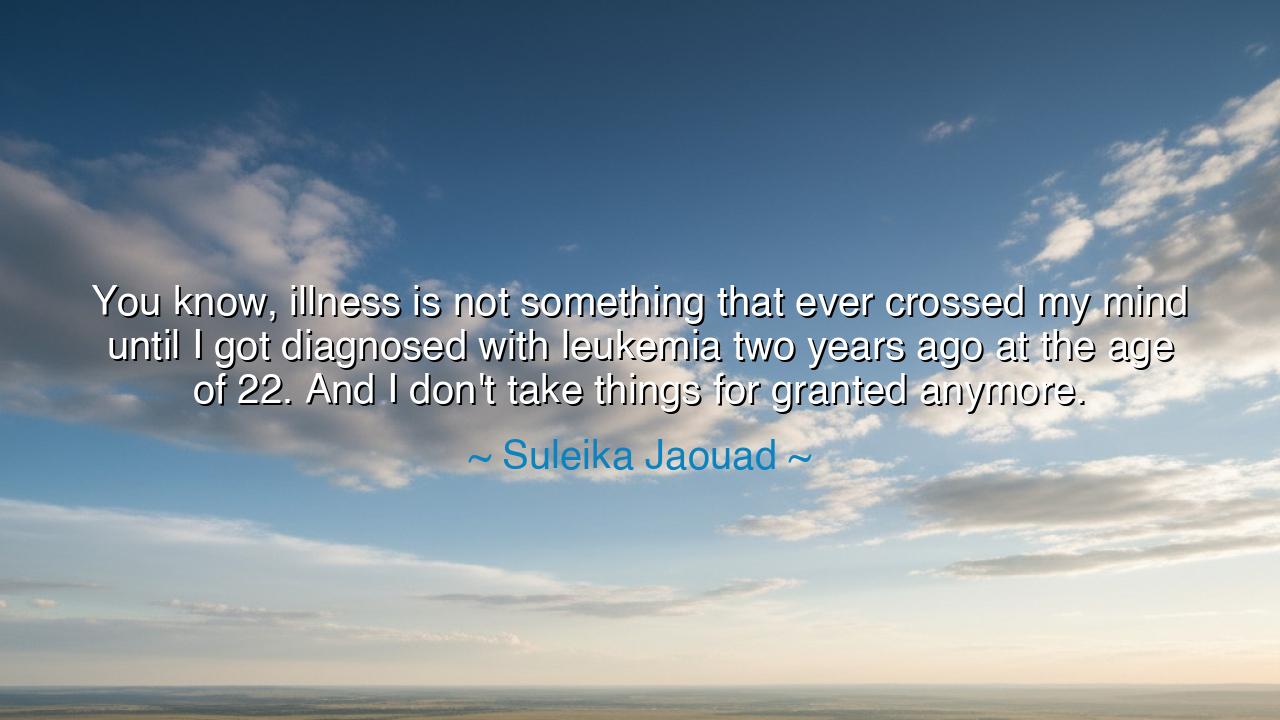
You know, illness is not something that ever crossed my mind
You know, illness is not something that ever crossed my mind until I got diagnosed with leukemia two years ago at the age of 22. And I don't take things for granted anymore.






"You know, illness is not something that ever crossed my mind until I got diagnosed with leukemia two years ago at the age of 22. And I don't take things for granted anymore." These profound words, spoken by Suleika Jaouad, capture the deep, transformative power of facing adversity. Her reflection speaks to the sudden shift that many experience when confronted by life-altering events—a shift from youthful invincibility to the fragility of life. At the age of 22, Jaouad was struck by a diagnosis that most young people feel distant from, yet she illustrates the universal truth that life is unpredictable, and that in facing our own mortality, we learn to cherish and value the simple, fleeting moments we once took for granted.
In the ancient world, the concept of life’s fragility was a common theme woven through philosophy and wisdom. The great Greek philosophers often reflected on the ephemeral nature of human existence. Socrates, for instance, in his final moments before death, famously said, "The unexamined life is not worth living." His words urged his followers to consider the brevity of life and to live with purpose, knowing that time was limited. Jaouad’s experience echoes this ancient wisdom, reminding us that health, like youth, can be fleeting. It is only when confronted with such a reality that we fully realize the preciousness of each day. In much the same way, Socrates’s death was a wake-up call to his followers, urging them to appreciate what truly matters.
The Roman Stoics, such as Seneca and Epictetus, also grappled with the concept of mortality and the human tendency to take life for granted. Seneca, in his letters, frequently discussed the importance of living each day as if it were our last, reminding his readers that death is not an external event but a natural part of life. He wrote, "Life is long if you know how to use it." The Stoic philosophers understood that the awareness of our mortality was not something to fear but to embrace, as it was the key to living a life of meaning and purpose. Just as Jaouad came to understand after her diagnosis, the awareness of illness or death can lead to a more vibrant, mindful existence—one that values the present moment and the gifts we are given, rather than taking them for granted.
Consider the story of Alexander the Great, who, despite his military conquests and extraordinary achievements, was ultimately faced with the limitations of his own body. In his final days, Alexander—whose name was synonymous with power and immortality—was struck by a sudden illness that led to his untimely death at the age of 32. His life, though marked by remarkable accomplishments, was also a reminder that no one, no matter how mighty, can escape the inevitable end. Just as Jaouad’s illness caused her to re-evaluate her life, Alexander’s death forced those around him to reflect on the transient nature of power and glory. Both stories speak to the universal lesson that health and time are gifts that cannot be taken for granted.
The lesson in Jaouad’s reflection is deeply transformative. She speaks to the value of living with intention, of embracing each day with the awareness that life is fragile and precious. Her shift from taking life for granted to appreciating each moment mirrors the teachings of the ancients, who believed that only through an awareness of life’s impermanence could we truly live with purpose and meaning. The illness she faced, though a hardship, led her to a deeper understanding of gratitude and appreciation—principles that the ancients upheld as essential to a good life.
Practical actions that we can take from Jaouad’s experience include slowing down and embracing mindfulness in our daily lives. The rush of the modern world often makes us forget that life’s beauty lies not in accomplishments or possessions, but in the moments of stillness, connection, and presence we share with those we love and with ourselves. We must also be grateful for the health we have, cherishing our bodies as sacred vessels that carry us through the world. Just as Jaouad found deeper meaning in her struggle, we too can find purpose in facing our own vulnerabilities and using them as tools to live with greater awareness.
As we reflect on Jaouad’s words and the wisdom of the ancients, let us remember that life’s fragility is not a cause for fear, but a reminder to live with gratitude, to seize each moment with intentionality, and to appreciate the gifts we are given, whether in health, relationships, or opportunities. Like Socrates, let us examine our lives and find meaning in each day, not waiting for illness or hardship to awaken us, but actively living with the awareness that each moment is both fleeting and valuable.






AAdministratorAdministrator
Welcome, honored guests. Please leave a comment, we will respond soon